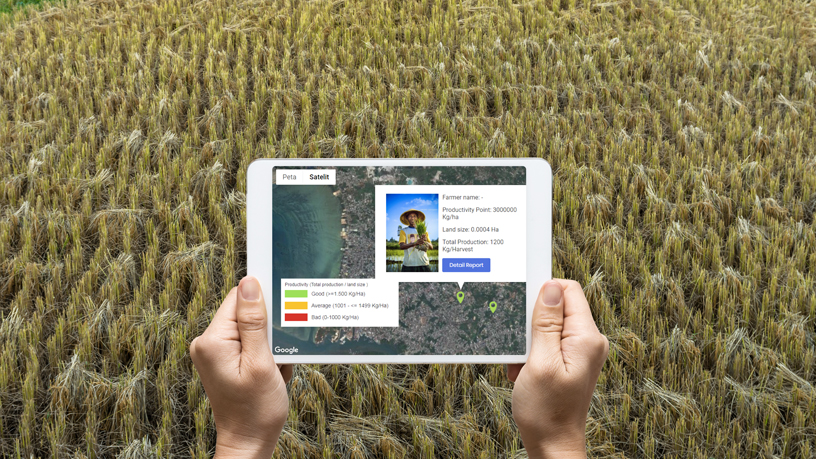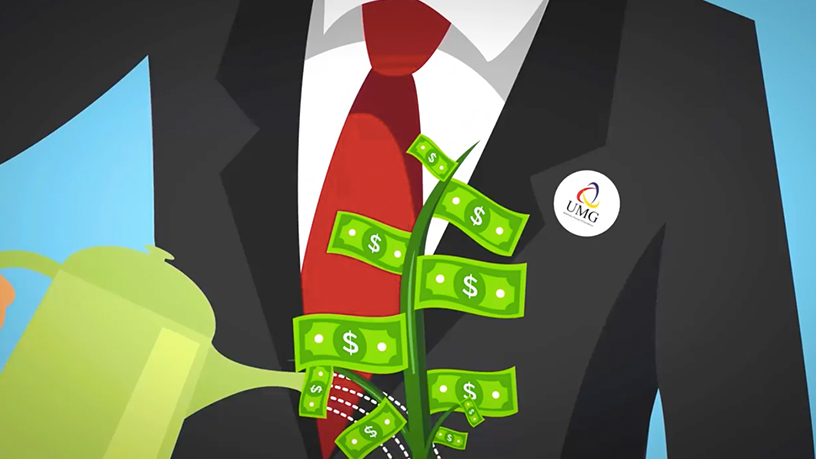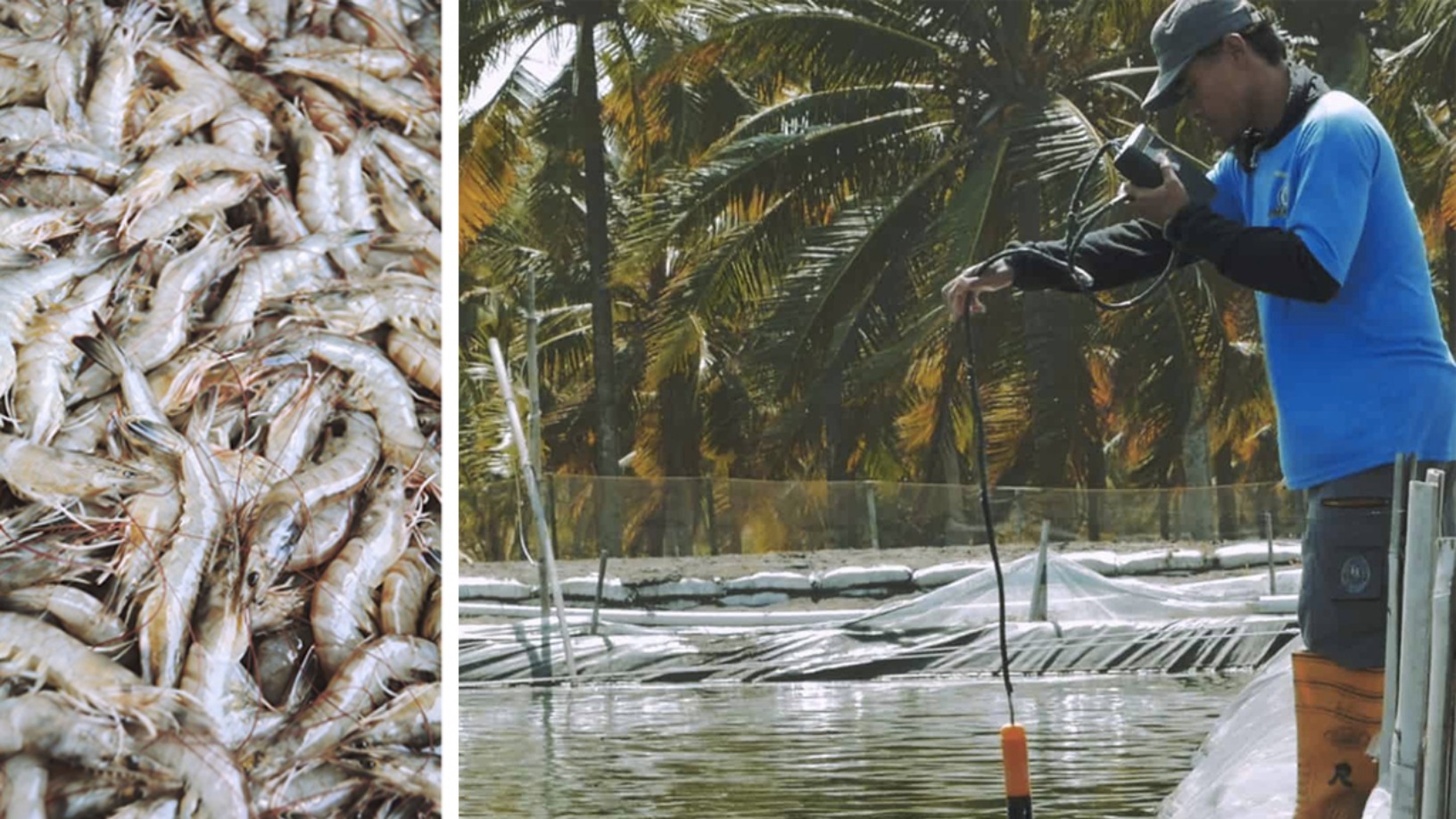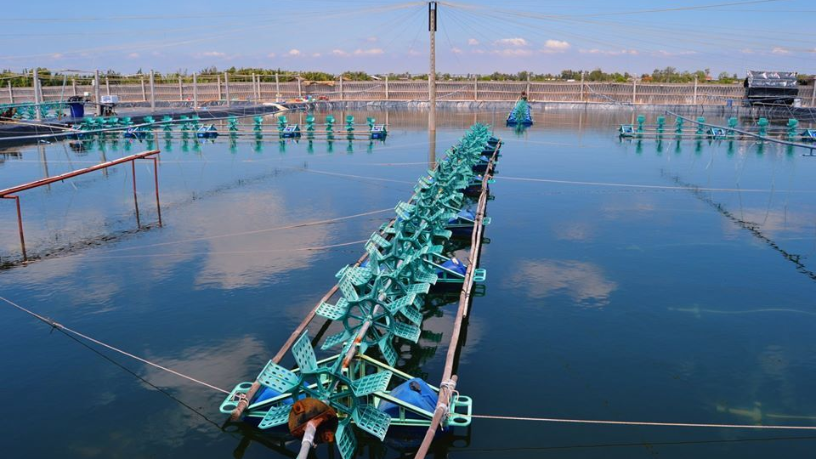8villages is known as one of the first agritech startups in Indonesia. The company first created LISA, an information network for farmers, to send important alerts and farming tips to subscribers via SMS. As the company grew and attracted investments, the product evolved into PETANI, a social media-like network that enabled interaction and knowledge exchange between farmers. 8villages then developed RegoPantes, a farm-to-table online marketplace, and DataHub, an app for field agents to collect data from farms and plantations for business purposes such as locating suppliers and productivity forecasts.
In 2012, Sanny Gaddafi, the founder of 8villages, had just shut down the local social media networks that he developed. He met Mathieu le Bras, a French agronomist with 10 years of experience working in Indonesia. Le Bras was looking for someone with the technical know-how to develop an information service and social media network for farmers, and Gaddafi turned out to be the man for the job.
In an interview with CompassList, Gaddafi recalled the origins of 8villages, how they run the business today, and what he hopes to change in Indonesia's agriculture industry.
For more in-depth research and insights about Indonesian agritech, the full Indonesia Agritech Report 2020 by CompassList is now available online to all readers.
Can you tell us more about your early product, LISA?
Compared to my past work building social networks, LISA was interesting because we were working with farmers who didn't have smartphones. Smartphones were not widely adopted and still relatively expensive back in 2012, and data connectivity was still an issue in rural areas. We decided to use SMS, like what Twitter did early on.
The response was very positive. We connected farmers with agriculture experts from universities and the ministries, who would answer the farmers' questions submitted by SMS. As the technology improved, smartphones became cheaper and data connectivity in rural areas got better. We then decided to develop an Android version of LISA. PETANI, GEMBALA, and NELAYAN apps for farmers, livestock rearers and fisherfolk respectively.
On the business side, early on we got funding from a grant. We had a year to focus on developing the innovation. The funding was very limited and we had to find a way to be sustainable. We found that other businesses can use a similar platform to manage their own communities, so we decided to white-label the platform. For example, an FMCG company wants to get connected to their small-scale retail clients, and provide content about financial literacy, management, and expert advice from practitioners in this field. Releasing the platform in white-label form was how we made money in the early days.
What about now?
After we developed that side of our revenue model, which was short-term, we tried to find more ways to help farmers. As we know, not every farmer has a smartphone or even a regular cellphone. We developed DataHub, an app for field agents such as government farming advisors. These agents would use DataHub to collect data about farms from the farmers who don't have a smartphone, and that data can be processed for various business needs.
We also learned that we can't help farmers with just providing information, but we need to help them sell their harvest. We decided to build RegoPantes, a marketplace platform, in 2018. Now we can serve B2B and B2C customers from RegoPantes.
How do you monetize DataHub and RegoPantes?
Firstly, we provide it in a SaaS model, which companies can use for their data collection purposes. We also do trading activities. For example, a factory or exporter wants to find out ways to make their supply more stable and sustainable. Our DataHub team would collect the data for them, which they can use to find suitable suppliers.
For RegoPantes, we monetize the transaction. We don't take a percentage cut, but we charge a flat fee of IDR 5,000 for the B2C consumers, no matter how much they order (minimum is 4kg). Consumers don't have to fuss about shipping fees because the prices on our website already includes shipping costs.
Another business we started this year is VLOGS, a logistics platform. We learned that logistics costs make up a big percentage of our food costs. We decided to build a logistics platform to help the farmers. At the start it was just to help RegoPantes ship goods, but as a tech company we want to make the platform we built usable by other parties too.
Have you received any further external funding?
Our first grant was from Mercy Corps Indonesia. We've received some funding since then. Our pre-Series A was around 2014. We also received new funding around two years ago from Salim Group, one of the conglomerates in Indonesia, who liked our idea very much. The funding gave us the room to develop our product into a more "total" solution. From there, we got the access we need to expand our business.
There's quite a bit of time between your funding rounds.
From the start we don't try to increase our valuation by leaps and bounds year by year; we want to make a sustainable business. Another for the big gaps is because at the time, agritech startups were not as "sexy" as it is now. Right now everyone wants to invest in agritech.
Back then people asked me if I was sure about doing business in agritech, and indeed finding investors was not easy. We can't convince them by saying "we want to help farmers." Other companies had to say things like "we do trading, selling harvest products, etc." The end result is the same, sure, but what we wanted to do is to prioritize helping the farmers. Selling is an effect of helping farmers.
8villages had to meet farmers to build the platform. How did you reach out early on? What about now?
Early on we had to go down to the villages and meet the farmers; that was how we used part of the grant money. The concept we used was "training for trainers," so the first few people who met us end up being able to teach others how to use the platform. It was very costly, so we gradually reduced our own trips. When we go out for fieldwork now, we usually partner up with telcos, ministries, universities; they're the ones who bring us there and we provide the content, i.e., the tech we can offer to help farmers.
We've worked with quite a few government agencies, like the Ministry of Communication, Ministry of Trade, Ministry of Village Development, and even with the Sports and Youth ministry; we supplied the SEA Games with fruits from our farmer network. Of course we also work with local governments.
How do you differentiate your marketplace product from everyone else's?
Let me ask you this: how do Tokopedia, Bukalapak, Shopee differentiate themselves from each other?
They're not much different, right? It's just about making their platforms more “sticky.”
Exactly. We can say a lot of things about how we're different, but at the end of the day we're all marketplaces helping farmers sell more directly. The differences are probably in the details of our execution. For our part, we provide three unique values: traceability of process, transparency, and fair price for farmers and buyers. Beyond that, we're still just another marketplace.
In total, how many farmers are part of your community?
In total, we have data of 2m farmers in our database. This is mostly from government data collection activities, so the data might be incomplete. More than 100,000 people are connected to us via SMS, but we only have their full names and phone numbers. We have about 40,000 users of our Android platform (PETANI), separate from the SMS platform; the data from this side is better, because they complete their profile. Among these, 5,000 are selling on RegoPantes.
Have you met with any resistance from local businesses, farmers, middlemen and government?
From the farmer's side, this is a new tech, and their business tends to be removed from the tech world. We can't expect to reach every farmer from the get-go, but we remember that our purpose is to help as many as we can. We're happy to get 5%–10% of farmers who gather and like our platform. If they like our platform, we hope they can share about it to everyone else.
From the government side, some local governments really want to work with us but for others, it's not a priority. We're still too small to attract attention from middlemen, really. What we want to do is to get them involved in our platform. We don't want to remove just any middlemen; we only want to remove middlemen who don't add value to the product out of the ecosystem. Of course, we also don't want to be middlemen ourselves.
What are your plans in the short term?
We've already finished proving new business models for the long term and we're ready to launch new products to help us sustain in the longer term. These are driven by our current situation, though. Right now we are planning to raise funds to accelerate the process, so we can replicate the models that we have learned and refined.
We will continue to develop new business verticals within the agriculture industry, all to help farmers. These things need funding, and we've already included this in our roadmap, i.e., how the funding will help build these platforms. With or without funding, we'll keep developing, but funding can speed the process along.
Where do you want to get funding from? The range of funding?
We can't share the specifics, but we can say that we're not in a hurry, we're not running out of money. We can raise any time we're ready. We don't want to raise funds from investors who can only see one side of the business, though. We'd like to work with investors who can not only give us money, but other added values like market access. If it's just about money, we can just ask Salim Group for more funding.
8villages built a social network for farmers, then a marketplace, and you're now going into logistics. What's the core problem that you want to solve?
It's all about the farmers. We want to accelerate the modernization of agriculture and farmers by helping the farmers adopt modern technologies.
We can't help farmers halfway. For example, we provide the farmers with up-to-date and accurate information through LISA, and that can increase their productivity. But if they sold their harvest to unscrupulous middlemen, the middlemen can just buy at lower prices since they have better bargaining power; all our efforts won't mean much.
Likewise, if we only help farmers selling their produce, we can't evaluate whether they're planting their crops properly. Was there anything sacrificed? Many farmers' children are exposed to pesticides; this is not something you can know from their productivity, because pesticides can help farmers improve their yield.
Then you have farmers who are not even exposed to technology; we can't help them with SMS or marketplaces since they can't access these features. Our DataHub partners can go to them to help get data and connect them with our features. There's a lot we have to do still.
Us city folks live with the benefits of technology, but we take it for granted and sometimes all the potential is squandered. In rural areas, they may not even have access to these benefits. Once they get exposed to technology, though, they're hungry for more. That's what I want to build. The hope is that when tech becomes ubiquitous in Indonesia's agriculture, it all gets used to improve productivity, and not just consumptive practices like social media and entertainment.
Why start with information?
We talk a lot about “smart cities,” but it turns out that the people aren't ready yet for these things. We want to make the people “smart” first. Our DataHub is already something of a smart village initiative, where people can make sense of data and predict future productivity.
What we're seeing now is that farmers are beginning to upgrade their own businesses. They're building their own warehouses, investing in trucks and vehicles. Rather than going to middlemen who handle the logistics, why not do it themselves? The farmers become stronger, they feel that their investments are worthwhile. We don't want to get funding and build 8villages warehouses and such. We want to eventually leave it to the farmers.
We also hope that people are more willing to learn more about where their food comes from, as a food security topic. We hope that they don't just eat, but care about the people who grow their food. Every spoonful of food is a result of someone else's hard work.
This interview is part of a series of conversations with leading startups and investors in Indonesia's agriculture technology sector. For more in-depth research and insights about Indonesian agritech, the full Indonesia Agritech Report 2020 by CompassList is now available online to all readers.














